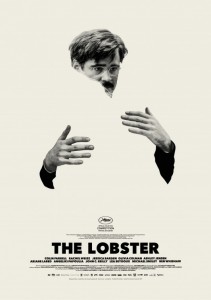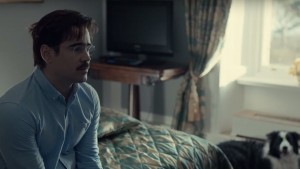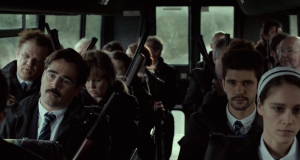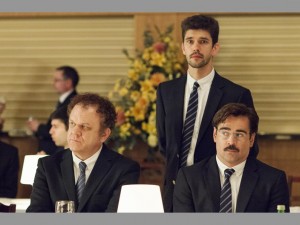
“The Lobster” is an absurd dark comedy acting as a commentary on the absurdities of modern dating. It exists in a universe where one must find a partner within a certain timeframe, lest they be transformed into an animal. The animal is of their choosing, though it’s never made quite clear whether or not the transformation is mandatory or voluntary. In order to even qualify for one’s reincarnation, they must be accepted into a ritzy hotel that hosts dating sessions. This is also where the transformation will be made if need be. A conversation a man has with an officer at the mall in town suggests finding a mate is a legality, as the man was being questioned on the whereabouts of his spouse.
That man is David (Colin Farrell), a recently divorced fellow who is a new recruit to the hotel. He has already chosen his animal before filling out the paperwork, that animal being a lobster. The reasoning is sound: lobsters live for over a hundred years, are fertile, and live by the sea. The hotel manager (Olivia Colman) compliments David on his fine choice, stating most choose something simple as a dog, which is why they’re not an endangered species. As luck would have it, David has brought along his brother who is now a dog after failing to find a spouse.

David is given forty-five days to find a partner. He can attain more for every person he shoots with a tranquilizer during the daily hunting session. The hunting session is the most bizarre aspect of the film (which is saying a lot), existing to show the animalistic instincts for survival and in locating a mate (via preying on them). Some excel at this, tacking an extra hundred days onto their stay, while others, such as David, never get in a shot. This is also meant to pair up individuals, with those bloodthirsty and skilled enough being considered a match, as are those seen as weak and sensitive.
The hotel itself is an avatar for a dating app. Just like how dating apps match prospects up via shared interests and personality tests, so do the activities at the hotel. One is meant to observe their fellow guests and pick up on their peculiarities. This backfires, as most will lie about themselves in order to seem as if they’re a match for someone, as the fear of dying alone, or in this case getting a second chance in the ruthless animal kingdom, is worse than living out ones days in a meaningless relationship. In this universe, companionship is far superior to loneliness. Loneliness is seen as a crime.

None of the people in the film besides David are even given a name, only referred to as such by their defining characteristic. Yorgos Lanthimos & Efthymis Filippou wrote them this way to represent how modern dating strips people of their true selves, leaving only their outer quirks to define them. There is no inner beauty, only outer. The only reason we know David by name is because he is our avatar. David represents us and we only truly know ourselves.
The people David comes across vary in outlandishness. Limping Man (Ben Whishaw) purposely bashes his head against a wall in order to cause a nosebleed, that way he can trick Nosebleed Woman (Jessica Barden) into thinking they’re a perfect match. Just as the two begin to notice their differences and argue, they’re given a child to keep them intact. Lisping Man (John C. Reilly) is an introvert whose chosen a parrot as his animal, which Limping Man makes sure to mock him for, as he’ll be a bird with a lisp. Heartless Woman (Angeliki Papoulia) is cold-blooded and seemingly only at the hotel for the hunting sessions. As his time draws near, David pretends to be as heartless as her to trick her into companionship, which works temporarily. He does so by mocking the suicide attempt of Biscuit Woman (Ashley Jensen), his own personal stalker.

Living outside of the hotel are the loners, who reside in the woods in which the hunting sessions take place. David eventually joins them after fleeing the hotel, only to discover they have just as strict of rules. Companionship is seen as a weakness amongst the loners, punishable via laceration of the tongue. One is put on this Earth to survive alone, with love only destroying the soul. The loners’ true existence is to show the black and white mentality that envelopes modern dating. You must either be in love or forever be alone; there’s no in-between.
It is with the loner’s where David finds true love, albeit with someone also defined by their characteristic. She is Short Sighted Woman (Rachel Weisz), with that characteristic catching David’s eye (pardon the pun), as he too is short sighted. Still, the reason the two fall in love is because they weren’t attempting to. They organically discovered their shared interests and feelings for one another, with the forbidden romance of the loners fueling their desire further. Short Sighted Woman also acts as the film’s narrator, which is more of a nuisance than guidance.
One must accept the cynicism in Lanthimos’ direction in order for “The Lobster” to work. If one is of the opposite view or simply dislikes the pessimistic approach, then the film will be viewed as a failure. If one agrees with the commentary or is willing to indulge in Yorgos’ worldview, then the film will be viewed as a success. This is a love it or hate it film, ironic considering the film exists in a love it or hate it universe.
Wherever one falls on “The Lobster,” it will certainly cause discussion like great art does! The film rattles around in one’s brain long after it’s over, especially on the meaning of the ending. The film may be a little long in the tooth, but it’s always engaging.
Final Rating: A-
